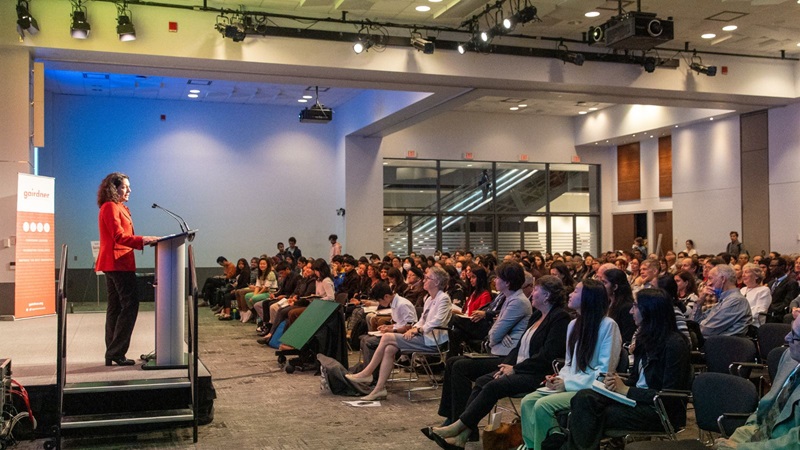Celebrating the 2023 Canada Gairdner Award Laureates Through Art

What better way to celebrate the ground-breaking and inspiring work of the 2023 Canada Gairdner Award laureates than through art. Gairdner Foundation commissioned artists whose work aligned with the 2023 Canada Gairdner Award laureates to create pieces inspired by their award-winning research.
Demis Hassabis and John Jumper, 2023 Canada Gairdner International Award
This whimsical robot is depicting the artificial intelligence program and groundbreaking brainchild of laureates Demis Hassabis and John Jumper - AlphaFold. The robot is seen reading amino acid sequences (watch the video of the robot scrolling and reading sequences). Amino acid sequences are the string of molecules that make up proteins. The way these molecules interact with each other within the string cause the protein to fold intricately with curls, loops and pleats. But, quickly and accurately predicting the protein’s final 3D structure is a challenge. Just like AlphaFold, this robot is analyzing the data through a neural network, which is a computing system inspired by the neural networks in our own brains, depicted as nodes & lines above its head. An accurate prediction of a 3D protein structure forms at the top as it computes. What took scientists months and years to do now takes AlphaFold minutes, accelerating scientific discovery.
Artwork by Leonora Martinez-Nunez, a Mexican Scientific Illustrator with a Ph.D. in Microbiology and postdoctoral experience in Protein Biochemistry.
Bonnie Bassler, Peter Greenberg and Michael Silverman, 2023 Canada Gairdner International Award
The quorum sensing process of bacterial cell-to-cell communication has important implications in human health and disease. This piece by Thom Leach/Amoeba Studios is a celebration of the revolutionary discoveries made by Bonnie Bassler, E Peter Greenberg and Michael Silverman on quorum sensing, and their well-deserved 2023 Canada Gairdner Award!
In the piece, Thom Leach used particle effects to represent the molecular nature of quorum sensing and capsule shapes to represent bacteria. The bacteria are shown to glow brightly upon reaching high density: a feature of the species Vibrio fischeri that sparked curiosity and paved the way for the first discoveries in this field.
José Belizán, 2023 John Dirks Canada Gairdner Global Health Award
This piece highlights the research of José Belizán, who was awarded for his works on evidence-based interventions surrounding maternal and child health in Latin America.
Belizán discovered a unique association between high calcium intake and lower risk of gestational hypertension disorders (HDP) in Guatemalan Mayan women. To make corn easier to grind for tortillas in traditional Mayan cooking, kernels are soaked overnight in alkaline water made with limestone. This process improves the taste and texture of the dough, but also results in a high calcium content that helps to regulate blood pressure during pregnancy. Thanks to this discovery, Belizán’s research greatly improved health disparities of women and children from all socioeconomic backgrounds.
Artwork by Claire Agosti, SayoStudio.
.tmb-cfthumb_s.webp?Culture=en&sfvrsn=e77b0479_1)
Christopher Mushquash, 2023 Canada Gairdner Momentum Award
Illustration of Christopher Mushquash by Alanah Jewell / Morningstar Designs. The design Jewell created was reflective of Mushquash’s work:
“I used eagle feathers in this illustration to represent Dr. Mushquash’s leadership and the ways in which he navigates the Western science world as an Indigenous researcher. Walking in both a Western world and an Indigenous world is no easy task: to be able to meet community needs while working through difficult systems takes incredible leadership and commitment. I also included eagle feathers to represent Dr. Mushquash’s community-based approaches, where he puts community and relationships at the forefront of his work. Dr. Mushquash advocates for the well-being of community and allows them to speak their truth.
The medicine wheel represents Dr. Mushquash’s understanding of Indigenous health and well-being from a cultural perspective: it represents the ancestral teachings that are given to us by elders and knowledge keepers, all of which ground Dr. Mushquash in culture, ceremony and community.”

Gelareh Zadeh, 2023 Canada Gairdner Momentum Award
Time-lapse of mixed-media work created by Kindra Crick to celebrate Gelareh Zadeh for advancing our molecular and genomic understanding of brain tumors and for her 2023 Gairdner Award.
Crick’s Cerebral Wilderness series explores the brain as a wilderness transformed by scientific discovery.
It was long believed that the blood-brain barrier completely walled off the brain’s tissue from the tendrils of blood vessels that fuel the brain. Before Zadeh’s discovery, it was assumed it would not be possible to detect any brain cancers with a blood test because of this perceived impermeability.
Zadeh worked to develop a test sensitive enough to pick up the smallest amounts of circulating tumor DNA with highly specific biomarkers in the blood; we now have a new, non-invasive way of detecting and discriminating between common brain tumors.
By challenging the assumption that the blood brain barrier was impenetrable, and comprehensively characterizing different brain tumor types, Zadeh’s work transformed the landscape in the diagnosis and clinical management of brain tumors, giving hope to individuals affected by brain cancer.
Crick is drawn to a quote by Daniel Boorstin stating, “The greatest obstacle to discovery is not ignorance - it is the illusion of knowledge.”
Our mapped knowledge is provisional and by scrutinizing what we think we know may lead to “Something Long Thought Impossible”, a quote by Zadeh from a 2020 University Health Network press release, and the title of this artwork.




.tmb-cfthumb_fb.png?Culture=en&sfvrsn=f6a77c5c_1)









